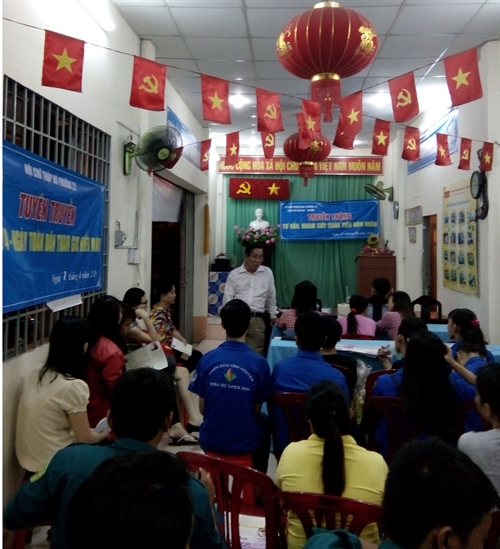 Society
Society

" />In a small house used for cultural, social and educational activities in Bình Thạnh District’s Ward 26, a group of young people was initially embarrassed when a young doctor explained how to use condoms. They were reluctant to answer questions about safe sex, causes for childlessness, reproductive health care and contraceptive methods.
 |
| Dr Đặng Phi Yến at HCM City Family Planning and Population Division teaches reproductive health care at Bình Thạnh District’s Ward 26. — VNS Photo Lan Phương |
Gia Lộc
HCM CITY — In a small house used for cultural, social and educational activities in Bình Thạnh District’s Ward 26, a group of young people was initially embarrassed when a young doctor explained how to use condoms.
They were reluctant to answer questions about safe sex, causes for childlessness, reproductive health care and contraceptive methods.
Gradually, the embarrassment faded. They were open to discussing these issues, occasionally bursting into laughter.
They were told that health checks before marriage would help identify problems such as an inherited form of anaemia, Thalassemia. If such problems are treated in a timely fashion, they will not affect their future children.
The doctor’s talk is a part of the Ward 26’s Pre-Marriage Club, held once a month.
Lê Ngọc Hà, 25, of the Bình Thạnh District, who attended the doctor’s talk, said it gave her a deep understanding about reproductive health and what she should do when she prepares to get married.
“I need this knowledge, which is not taught carefully at schools and seldom by parents. When I have had question about my reproductive health or love, I often had to look on the internet and talked with my close girlfriends.”
In Việt Nam, these issues are difficult to talk about openly between young people and parents. Many parents think they are taboo because knowing about these issues at an early age may encourage children to try having sex.
Dr Nguyễn Hữu Hưng, deputy head of the city Department of Health, said Vietnamese children reached puberty at the age of 10 to 11 compared to 13-14 in the past.
“When changes occur in children’s body, they feel curious. It is vital to provide the right knowledge by doctors or teachers, instead of letting children find out things on the internet,” Hưng said.
Moreover, with easy access to information and different cultures on the internet and social media, many have a “complaisant point of view about married life and sex,” he said.
They live together without marriage, he said, adding: “That is the reason why it is important to provide knowledge on reproductive health and health examination before marriage to young people.”
Health examinations before marriage were not common in most places and it was difficult to convince couples, especially men, to undergo testing, Hưng said.
Nguyễn Thị Phương Lan of District 12, who is going to get married, said she never thought about having an examination.
The city’s health officials work with local judicial divisions to encourage couples who come to register for marriage to take health tests.
Moreover, nine centres providing free counselling about reproductive health and health examinations have been set up since 2011 in many of the city’s districts, as well as those with a high number of migrants.
The centres aim to improve knowledge and practical skills in reproductive health care and married life, reducing abortion and increasing voluntary health examinations before marriage among young people and juveniles in the city.
As of 2015, more than 30,000 people have received the counselling.
The sites’ health officials have also worked with schools, landlords and companies to provide this knowledge to students and workers.
Dr Đặng Phi Yến at HCM City Family Planning and Population Division, which manages the sites, said that they encouraged 3,157 couples to come to the city obstetrics hospitals and Centre for Reproductive Health Care for health examination before marriage.
The division conducted a study on satisfaction and found that 69.9 per cent were satisfied with the methods of counselling such as via email, face-to-face and telephone.
Of those polled, 85.6 per cent were pleased with the counsellors’ communication and other skills.
Nguyễn Thị Thu Nguyệt, head of the management board for the counselling site in District Thủ Đức, said that young couples often agreed to undergo health examination before getting married after counsellors encourage them.
“However, they are reluctant to go to the city’s obstetrics hospitals, which are always crowded with patients waiting for health checks,” Nguyệt said.
The city’s Department of Health should instruct district-level hospitals with obstetrics wards to conduct the examination, she added.
Đào Thị Hồng Hạnh, a population specialist in Ward 26, added that some couples could not afford the cost of the examination.
Lê Thị Kim Hương, head of the Management Board for Counselling Site in District 4, suggested the city train more counselors for the sites. — VNS




